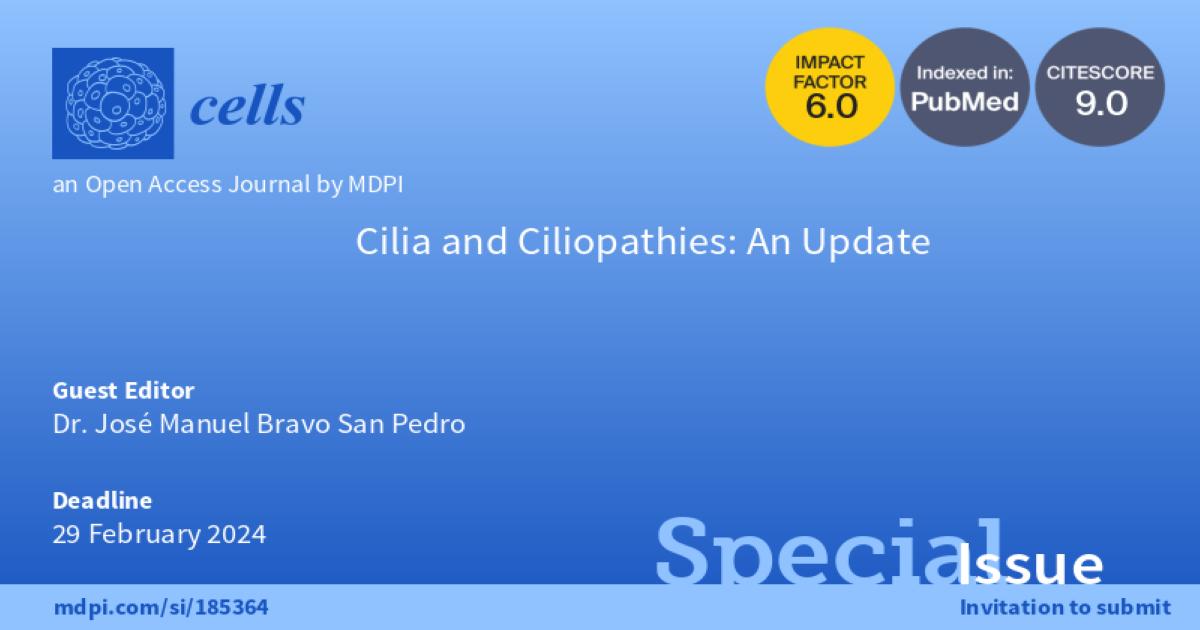Cilia and Ciliopathies: An Update
A special issue of Cells (ISSN 2073-4409).
Deadline for manuscript submissions: closed (29 February 2024) | Viewed by 195

Special Issue Editor
Interests: autophagy; lipid metabolism; ciliopathies; neurodegeneration
Special Issue Information
Dear Colleagues,
Ciliopathies are a group of genetic disorders characterized by abnormalities in cilia, which are tiny, hair-like structures found on the surface of many cell types throughout the human body. These cilia play several essential roles in maintaining physiological conditions in the human body, at respiratory, reproductive, digestive, sensory, kidney or development and signaling level. Thus, when cilia function improperly, it can lead to a wide range of health problems affecting multiple organ systems and can manifest as diverse clinical symptoms, making diagnosis and treatment a challenge. For this, understanding the role of cilia is essential for research and development of potential therapies for these disorders.
Dr. José Manuel Bravo San Pedro
Guest Editor
Manuscript Submission Information
Manuscripts should be submitted online at www.mdpi.com by registering and logging in to this website. Once you are registered, click here to go to the submission form. Manuscripts can be submitted until the deadline. All submissions that pass pre-check are peer-reviewed. Accepted papers will be published continuously in the journal (as soon as accepted) and will be listed together on the special issue website. Research articles, review articles as well as short communications are invited. For planned papers, a title and short abstract (about 100 words) can be sent to the Editorial Office for announcement on this website.
Submitted manuscripts should not have been published previously, nor be under consideration for publication elsewhere (except conference proceedings papers). All manuscripts are thoroughly refereed through a single-blind peer-review process. A guide for authors and other relevant information for submission of manuscripts is available on the Instructions for Authors page. Cells is an international peer-reviewed open access semimonthly journal published by MDPI.
Please visit the Instructions for Authors page before submitting a manuscript. The Article Processing Charge (APC) for publication in this open access journal is 2700 CHF (Swiss Francs). Submitted papers should be well formatted and use good English. Authors may use MDPI's English editing service prior to publication or during author revisions.
Keywords
- axoneme
- basal body
- cilia
- ciliopathies
- metabolism
Benefits of Publishing in a Special Issue
- Ease of navigation: Grouping papers by topic helps scholars navigate broad scope journals more efficiently.
- Greater discoverability: Special Issues support the reach and impact of scientific research. Articles in Special Issues are more discoverable and cited more frequently.
- Expansion of research network: Special Issues facilitate connections among authors, fostering scientific collaborations.
- External promotion: Articles in Special Issues are often promoted through the journal's social media, increasing their visibility.
- e-Book format: Special Issues with more than 10 articles can be published as dedicated e-books, ensuring wide and rapid dissemination.
Further information on MDPI's Special Issue polices can be found here.






